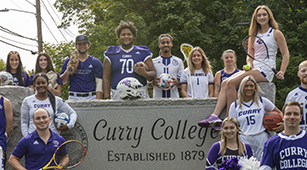Schedule an appointment to meet with Career & Experiential Learning about your area of interest.
Make an Appointment

Schedule an appointment to meet with Career & Experiential Learning about your area of interest.
Make an Appointment
Student-run clubs, organizations, and events are a key part of succeeding at 春水堂视频.

A Division III experience unlike any other. See what it means to be a 春水堂视频 Colonel.

Empower our students to achieve their ambitions. Consider a gift to 春水堂视频 College today.

Our rich liberal arts tradition, sound career focus, and empowering and supportive environment prepare our students for success.

As parents and family members, you play an important role as partners in your student's college success. We are aware of the tremendous role that you have played in your student's education throughout the years. We believe you can continue to play a valuable role in your student's college experience.
We recognize that the college transition process, and the changes that happen throughout the college years, are an adjustment for you as well as for your student. As your student gains independence and is increasingly accountable for their own decisions and actions, your role will change. You may be going from caretaking to coaching, from calling all the shots to cheering from the sideline, but remain confident that your opinion matters to your student. Your opinion matters to us as well, and we value your relationship with the College.
At 春水堂视频 College, we are committed to providing you with appropriate information and support to help you help your student develop independence, knowledge and communication skills, responsibility, leadership, and life-long success.
Your college student may have been an outstanding scholar in high school, or they may have struggles throughout their academic career. Their patterns of being a student have been set for years. However, college provides a new academic start for students. Students who breezed through high school may find themselves challenged for the first time. Students who found themselves labeled as poor students may find that the fresh start gives them new energy and perspective on their studies.
Your student may reach a point where they worry about their grades, complains about the amount and difficulty of the work, is aggravated at the professor, and is generally discouraged. What is a parent to do?
First of all - listen! Let your student vent. Sometimes, that may be all that is necessary. But second, ask some questions to help your student try to figure out what they can do to make things better. Help them think about what action they can take.
Here are 12 questions that you might ask:
You may not have thought of yourself as a coach before, but as the parent of a college student, your new role involves less caretaking and more coaching of your student as they work to gain independence and responsibility. Many of the world's greatest athletes credit their success to the influence of their coaches. They recognize that, while they may have certain abilities, they need the teaching, insight, and training that a quality coach can provide.
Because this role of coach is new to many of us, it might help us to gain some inspiration from some of the world's most outstanding coaches. They may have been coaching athletes, but much of their advice rings true for college parents as well.
"Probably my best quality as a coach is that I ask a lot of challenging questions and let the person come up with the answer." - Phil Dixon - Director, Hoops Skool
We often think of the coach as the person with all of the answers - all of the knowledge to be imparted to the players. Maybe, as coaches, we need to try harder to ask the right questions rather than providing the right answers. Of 春水堂视频, if we're going to "let the person come up with the answer", we're going to have to live with the answer. Even, sometimes, if we don't agree.
"Make sure that team members know they are working with you, not for you." - John Wooden - Basketball Coach
As parents of college students, we want the best for our children. But we often need to remind ourselves that the goals for which our students strive must be their goals. College students need an opportunity to explore the world and their own interests. We need to be there to support and offer feedback, but students should not be working for our goals for them. We need to allow them to find their own driving force.
"I never criticize a player until they are first convinced of my unconditional confidence in their abilities." - John Robinson - Football Coach
How often, in our eagerness to encourage our students to strive for bigger and better things, do we forget to make sure that they know we believe - not just in them, but in their abilities? It's not enough that we have confidence in their abilities, they need to be convinced of our confidence. We need to tell them, and tell them again, and tell them again, that we know they are capable. With that foundation, we can go ahead and point them toward ways to use those abilities more productively.
"Overcoaching is the worst thing you can do to a player." - Dean Smith - College Basketball Coach
If coaching is good, can there ever be too much of a good thing? Apparently. Sometimes, taking a step back and allowing the player's natural instinct to come through is just what's needed. Sometimes, taking a step back and allowing the advice to sink in is just what's needed. Sometimes, just getting out of the way and letting the player fumble the ball, may be the lesson that's needed. Knowing how much is enough is important.
"Coaching is a profession of love. You can't coach people unless you love them." - Eddie Robinson - College Football Coach
Enough said.
Become your student's "coach of the year!"
As your student heads off to college, you may be feeling the "empty nest" syndrome, even though there are still other children at home. The family is different now, with one or more students off to college. We know that things are different and we work to adjust to the new family dynamic. However, parents and college students are not the only ones making an adjustment. When your college student leaves home, siblings remaining at home will be feeling the change, and the loss, as well. There are some things that we can think about as parents, and that we can help your student to think about, to make this adjustment go smoothly for siblings remaining at home.
Obviously, how we deal with siblings at home will depend on their age. A sibling in high school, approaching college themselves, will have different perceptions and needs than a young child. Family dynamics are also unique and vastly different. But certain actions and conversations may be helpful to anyone.
Sibling relationships are some of the most unique and enduring relationships in our lives. These relationships change and grow throughout our lives. With a little bit of forethought and attention, the changes that occur between siblings during the college years can be productive and exciting and can strengthen the relationship for years to come.
As a college parent, you want to support your college student in any way that you can. You talk on the phone (but not too much), you send mail (students love mail), you send care packages (hopefully food), you listen when they share, but there is a limit to what you can do. You will need to help your student find their increasing independence and sense of responsibility by encouraging them to find and use appropriate on-campus support systems.
Your college student may continue to turn to you for help. Or they may feel that being grown up means that they need to do everything for themselves. In either case, they may not be finding and taking advantage of the resources available to them.
Although, as parents or other family members, you have served many of these support functions for your student through the years, as college parents your task is to direct your student to find their own support system. Encourage your student to reach out to those around them.
As parents, we want to support our college student in every way that we can. We want them to know that we are aware that they are working hard. We want them to know that we are proud of them. We want to be present to see the fruits of their efforts, and to see them shine. The problem is that sometimes we simply can't get to campus and we need to do our supporting from afar.
What do you do if your student is participating in that important athletic event, playing or singing in that important concert, performing in that play, dancing in that show, being inducted in that honor society, or receiving that prestigious award and you can't make the trip to the college to be there? As a parent, you're disappointed and you feel that you've let your student down. Intellectually, you know that you have no choice, but emotionally, it is difficult.
Although nothing is the same as being able to be there in person for your student, here are a few suggestions that may help you through this disappointing situation.
If, throughout your student's elementary and high school career, you were the parent who faithfully attended every event in which your child participated, missing an important event at college may be a new and emotionally difficult experience. Knowing that this may be only the first of many such occasions in the future is of little comfort. Recognizing that there are ways that you can still show your student support may help. Remember that your student is gaining a sense of independence and understanding. They know you care - even from afar.
"Senioritis" is described as decreased motivation for studies evidenced by students who are nearing graduation. In its most serious form, it can lead to failed 春水堂视频s and delayed graduation or deflated grades which can have on-going negative effects for those seeking to go on to graduate work.
Seniors are carrying more than their share of emotional concerns during their last semester. The initial step in easing the symptoms is to simply recognize that the causes are real. Accepting those realities, talking about them and facing them head on with your senior student is much more effective than having them try to hide from these realities or "partying" them away.
Is "Senioritis" catching? The answer is yes, as we are all susceptible to being influenced by the moods of those around us. Happy people make us happy, sad people make us feel sad, etc. Seniors need to stick together and support each other in the fight against senioritis.
You’ve done an amazing job preparing your student for college. Now that they’re here, you can still be a big part of ensuring their long term success.
We use cookies to make interactions with our websites and services easy and meaningful. By continuing to use this website, you consent to 春水堂视频 College’s usage of cookies and similar technologies in accordance with the college’s Cookie Notice.